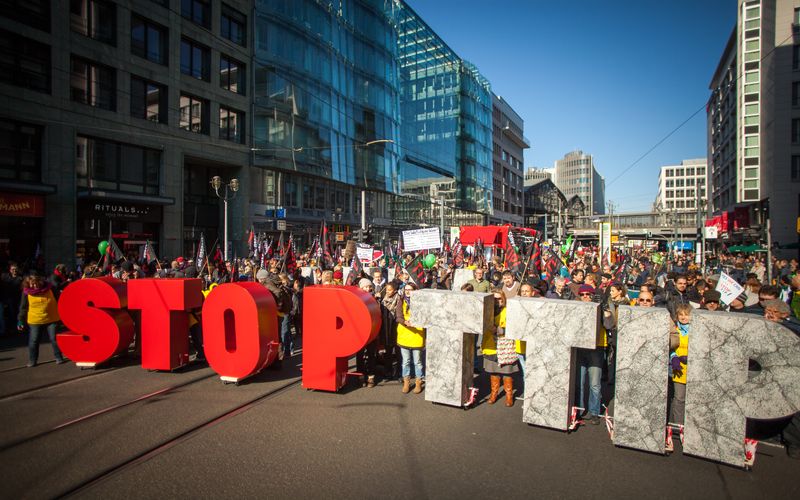European trade deals: Greenwashed but still dirty
All the versions of this article: [English] [Español] [français]
In 2024, bilaterals.org celebrates its 20th anniversary. During this time, bilaterals.org has served as a collaborative and open online platform supporting struggles against free trade and investment agreements around the world, and campaigns against RCEP, TPP, the ISDS mechanism and many other processes.
To mark the occasion, we are publishing a series of five articles written by the movements and activists who have been at the heart of these campaigns all along. The articles aim to take stock of what has happened over the past 20 years and to look ahead to the resistance against free trade agreements in the years to come. They share experiences from Africa, Asia, Europe and Latin America, connecting the dots between different struggles.
- European trade deals : Greenwashed but still dirty
—
European trade deals: Greenwashed but still dirty
by Lora Verheecke, 18 November 2024
ISDS. Acronyms are common in the European Union (EU) political circles. ISDS stands for an unfair judicial mechanism given by European institutions to their multinational corporations, known as Investor-State Dispute Settlement and found in most free trade agreements. It is a privilege for big business to sue countries for huge sums of money, mostly in the Global South. Trade has become increasingly “politicised” in the EU over the past ten years. But the response of the European institutions has not been to change course, but only to change discourse, with minor changes, and major public relation campaigns.
When I arrived in Brussels ten years ago, it took me a while to understand the ISDS acronym, the EU trade regime, let alone to explain it to my grandmother. A few years later, the European Commissioner said that ISDS had become the most toxic acronym. Bilaterals.org helped to make the acronyms toxic, especially with its ISDS Platform. It gave all activists a hub to collect news and background information, to make sure we were always relevant. And we were relevant and active.
In Europe, when the EU and the US started negotiating a trade deal with ISDS, civil society mobilisation took off and spread widely, across Member States, in different ways: demonstrations, fun actions, etc.
In parallel, Canadian and European multinationals had also been lobbying for a trade deal between Canada and the EU since 1999 and they finally got it in 2017, under the acronym CETA.
Trade officials and multinationals worked hand in hand for two major trade deals with ISDS. But mobilisation derailed their first project. The trade deal between the EU and the US was abandoned and the Canada-EU agreement has only been provisionally applied - with a reformed ISDS that has yet to come into force.
What mobilisation did was important, key, major: it broke through the EU Commission’s hegemonic discourse on trade deals. Social movements exposed what trade deals are all about: a project for European multinationals. But the response of the EU institutions was also crucial: the EU greenwashed its trade deals. It slightly reformed ISDS and changed its acronym… It also added a “stronger” chapter on sustainable development in its trade deals. But the latter does not change the trade pattern of the deals. The New Zealand- EU free trade agreement says that European countries will import agricultural goods from the other side of the planet, even though they produce them at home. But the EU Commission has managed to win over some part of civil society with this new chapter on sustainable development. Some actors see this reform as a change, others see it as a cosmetic change, and designed to make us believe that change is possible through trade agreements.
Ten years on, today, the EU is still negotiating major trade deals. Although these deals are no longer between two major developed markets, the EU is still promoting the interests of its large corporations across the world. Recently, the EU has just approved a trade deal with Chile, with one major objective in mind: to import more minerals for European multinationals, especially in the defence, digital and automotive industries (think electric vehicles for the so-called “energy transition”). For European social movements, it is important to be reminded of the dangers of extractivism, as the mines on European soil have been closed for a long time. This is how bilaterals.org is useful for European movements. It reminds us, Europeans, of the reality of other continents, and as much as we try not to, makes us stop thinking of Europe as the centre of the world. It also helps European social movements to derail, counter and unravel the narrative of European institutions and lobbies.
Today, I can speak to "experts" and representatives of the European institutions using many acronyms (lucky me!). European decision-makers may be changing course due to social pressure, but their goal remains unchanged, their mandate is clear: to represent the interests of European transnational corporations. It helps to use as many channels as possible, especially bilaterals.org, to alert the public around the world. It shows how the strongest economic actors still find their way into the corridors of power of the EU, when we need the planet and the most vulnerable around the world to take power away from them.






